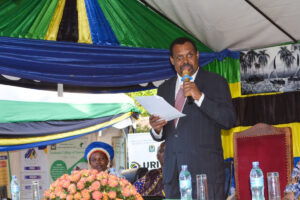Did you know that nearly 60% of the waste in Dar es Salaam, Tanzania is food waste? It ends up in waste disposal sites where it produces methane, a potent greenhouse gas whose reduction is critically necessary to reduce global warming.
Tanzania is embarking on a journey to address methane emissions, through collaborative efforts aimed at enhancing urban resilience and tackling climate change. Tanzania will be one of 15 countries to be included in a global methane initiative spearheaded by the World Bank, that aims to reduce emissions of this potent greenhouse gas. As part of the World Bank Climate Action Plan, reducing methane emissions was identified as a cost-effective way to reduce the rise in global temperatures and its impacts.
Methane is a strong greenhouse gas that stands out for being 80 times more potent and dangerous than carbon dioxide over a 20-year period. Addressing it is a significant challenge and but one that has major benefits in the fight against global warming.
Tanzania will focus on reducing methane produced from its livestock and agriculture sectors, and from solid waste produced in the country’s largest city, Dar es Salaam. It will be a collaborative effort among the Government of Tanzania, private sector, civil society, communities, and households. The British High Commission, Government of Sweden, Ministry of Foreign Affairs of the Government of the Netherlands, and the World Bank have joined the effort as part of a broader push to improve solid waste in Dar es Salaam. Livestock emissions will be supported as part of the Global Methane Reduction Platform for Development in Tanzania and proposed World Bank financing that would improve the competitiveness of livestock operations.
Livestock and Methane
The livestock sector contributes 14.5% of all man-made greenhouse gas emissions globally, with the largest contribution from the methane produced coming from animal digestive systems. In Tanzania, a single cow emits over 80 kg of methane per year and Tanzania’s livestock sub-sector, which is home to 36.6 million cattle, is a significant source of greenhouse gas emissions. As populations grow and the demand for livestock products rises, mitigation strategies are crucial for the livelihoods of smallholder farmers, who rely heavily on livestock. These strategies include optimizing feeding practices and implementing efficient manure management practices that reduce emission intensity while improving production. Analysis shows that mitigation interventions, along with control of animal numbers over the next six years, could reduce emissions by 13%, while increasing production by 29%.
The World Bank is developing a Results Framework for monitoring methane emissions in livestock operations in Tanzania, helping track progress and foster consistent project assessments and accurate emission baselines, enhancing the efficiency of methane emission reduction efforts.
Solid Waste and Methane
In Dar es Salaam, solid waste is the largest emitter of methane, accounting for 55% of methane emissions from the city. Between 2024 and 2040, these emissions are projected to increase further by over 90%. However, it can be managed; by deploying established technologies at scale, it is possible to reduce up to 80% of the emissions from solid waste.
“Dar es Salaam boasts numerous innovative programs tackling food waste, with vast potential to mitigate the city’s impact on global climate change; the World Bank initiative aims to collaborate with these groups, leveraging their expertise and local insights on climate change to scale them at a city level,” says John Morton, Senior Urban Specialist at the World Bank.
Nipe Fagio, a local environmental organization, is utilizing insects (black soldier fly larvae) for food waste processing, converting food waste into compost and insect protein. Kinondoni Municipality’s Mabwepande Composting facility, is also processing food waste from the city’s markets. Scaling both initiatives could result in a significant reduction in methane emissions. Reducing food waste during distribution and at households also has a large potential to reduce emissions and will be targeted under the initiative.
Investing in Methane Mitigation
Tanzania’s methane mitigation will be supported by the Dar es Salaam Metropolitan Development Project (DMDP), aiming to modernize the city’s waste management infrastructure, focusing on reduction, reuse, recycling, and treatment. Nyariri Nanai, the DMDP Coordinator, emphasized “Tanzania is committed to methane reduction through comprehensive waste management strategies as part of the DMDP, ensuring a cleaner, more sustainable future for all Tanzanians.”
While efforts aim to reduce emissions they also aim to increase production, and the planned Tanzania Livestock Resilience and Competitiveness Project will help transform the livestock sector, focusing on building economic growth and ensuring a sustainable future capable of meeting global food demands while addressing climate change.
The global imperative to reduce climate change is generating international interest in contributing to the initiative. “The UK’s vision is to work with partners to mitigate, adapt and build resilience to climate change, and protect nature. Through this project, we have the opportunity to work with Dar es Salaam city authorities and the World Bank, to simultaneously improve urban resilience and the city’s waste management systems,” said Kemi Williams, Development Director, British High Commission, Tanzania.
The success of the methane initiative hinges on the collective efforts of various stakeholders including government, NGOs, the private sector, the informal sector, financiers and donors, and the community at large. Through united efforts, the initiative aims to set a benchmark for sustainable urban development and climate resilience in Tanzania.
Source: allafrica.com














